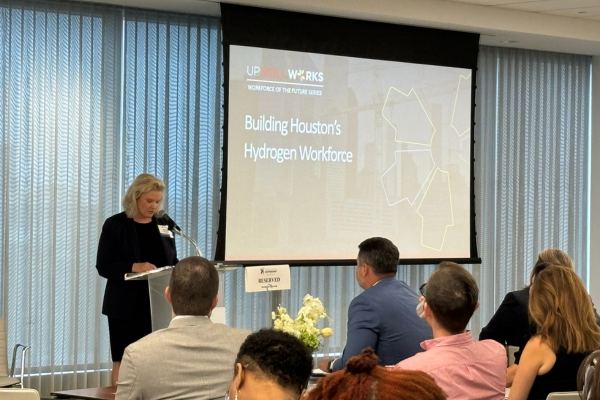Work Culture is Key in Combating "The Great Resignation" in Houston
Published Aug 19, 2021 by Maggie Martin
The national employment market is undergoing a massive shift. As covered in the Partnership's most recent edition of Houston: The Economy at a Glance, employers across the country are struggling to hire employees and job openings are at a record high of over 10 million.
There are also nearly four million people who quit their jobs in June with the largest increases coming from professional and business services, durable goods manufacturing, and state and local government. It's part of a trend playing out across the country called "The Great Resignation."
For insight on the best practices Houston employers can adopt to retain—and recruit—top talent amid this movement, we chatted with Jill Chapman, Senior Performance Consultant with Insperity, a Partnership member that provides human resources and business performance solutions.
From an HR consulting perspective, what are some of the biggest factors driving The Great Resignation?
The Great Resignation is impacting employers of all sizes and industries. The uncertainty of the COVID-19 pandemic encouraged many workers to stay with their current employer and delay plans to change jobs.
There are several factors leading employees to change jobs, from burnout to boredom and pent-up demand. Simply put, the sheer volume of available positions allows employees to handpick jobs that fit their desired career path and work lifestyle.
Another possible reason is how the company responded to the pandemic and any workplace adaptations that followed. For instance, employers that prioritized their people and provided the resources to support them and their families at the height of the pandemic will have a high degree of buy-in from workers.
What challenges does this pose for Houston employers?
Finding and attracting talent has been a challenge for small businesses several times in recent memory, but the current shortage's circumstances are unlike any other in recent memory. With companies facing a dearth of applicants, retaining existing employees must take on increased importance. The increase in employee resignations will worry many companies, particularly smaller employers, who may not offer the compensation or benefits of larger competitors.
What are three ways Houston employers can retain their employees?
First and foremost, employers need to foster a culture in which employees feel valued and trusted. While salary is an essential consideration for all workers, other factors may be more persuading, especially when appealing to younger generations. In light of the pandemic's uncertainty and mental health challenges, some workers are looking for more than a paycheck. A robust and strategic culture can be the differentiator.
Professional development opportunities are another perk that can help employers retain workers. Investing time and money in training demonstrates the value businesses see in their people and can create long-lasting retention.
An employee assistance program, or EAP, is essential in the post-pandemic workplace. EAPs are a collection of benefits and resources designed to support workers and their family's wellbeing. They often include mental health tools, counseling services, referrals and practical information about various work and life topics. In addition, they provide employees with a customized and anonymous support system provided by their employer.
What are three ways Houston employers can recruit new talent?
Corporate culture should be priority number one for Houston employers that are hiring. An established workplace culture that communicates company values can help attract applicants across the multigenerational workforce. Job descriptions should also detail the organization's mission and include any unique perks or volunteer efforts that show the culture in action.
Houston businesses should keep in mind that some job seekers are hesitant to return to an in-person workplace. However, small or medium-sized employers have a much higher degree of flexibility to lead with care, concern and empathy. As a result, SMBs may be able to adapt their work schedules, offer remote work or tailor their benefits or perks to fit the needs of their employees.
With workers at a premium, considering alternative candidates and keeping an open mind may uncover hidden gems. Recent graduates and "boomerang" employees - workers who have previous experience at the company - are two examples of unconventional applicants who others may overlook.
How do you anticipate the Great Resignation will affect Houston area workplaces in the long term?
Long-term, Houston workplaces will be more adaptable and open to remote or hybrid work. Workers and business owners have learned the benefits and drawbacks of remote work during the pandemic, and this will impact workplaces moving forward. For example, physical offices may be less busy as more employees can work remote or dictate their schedule.
The impact of increased turnover and resignations on the Houston labor market should be minimal. There will always be people ready to change jobs and companies hiring. However, business leaders may need to think outside the box to find the talent they need to drive their company forward.
Read this month's edition of the Greater Houston Partnership's Houston: The Economy at a Glance for insight into the delta variant, rebounding travel, economic growth and population gains in the metro area over the past decade.
Insperity is a member of the Greater Houston Partnership. Learn more about our 900 member organizations through our Membership Directory.
 The Houston Report
The Houston Report



















